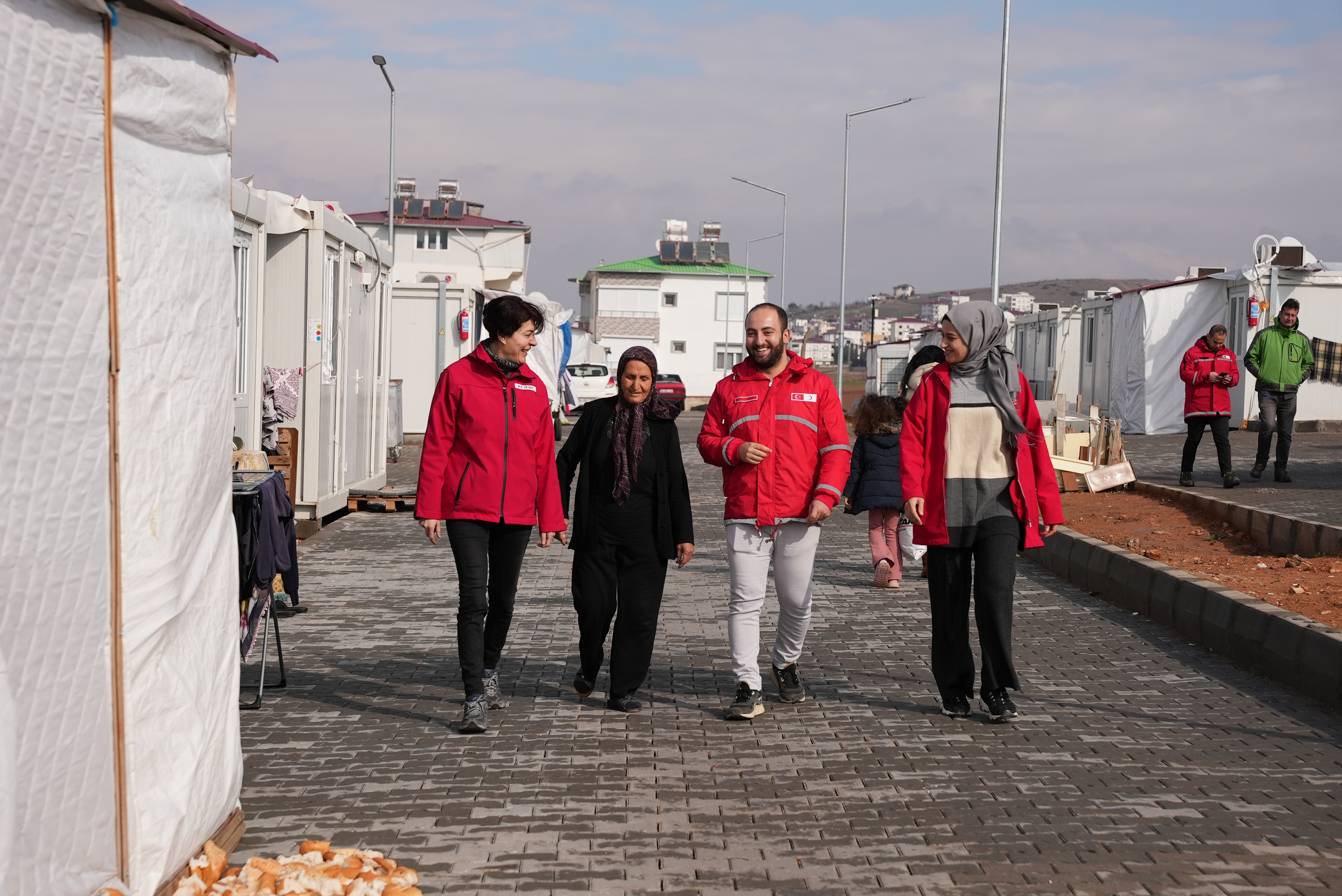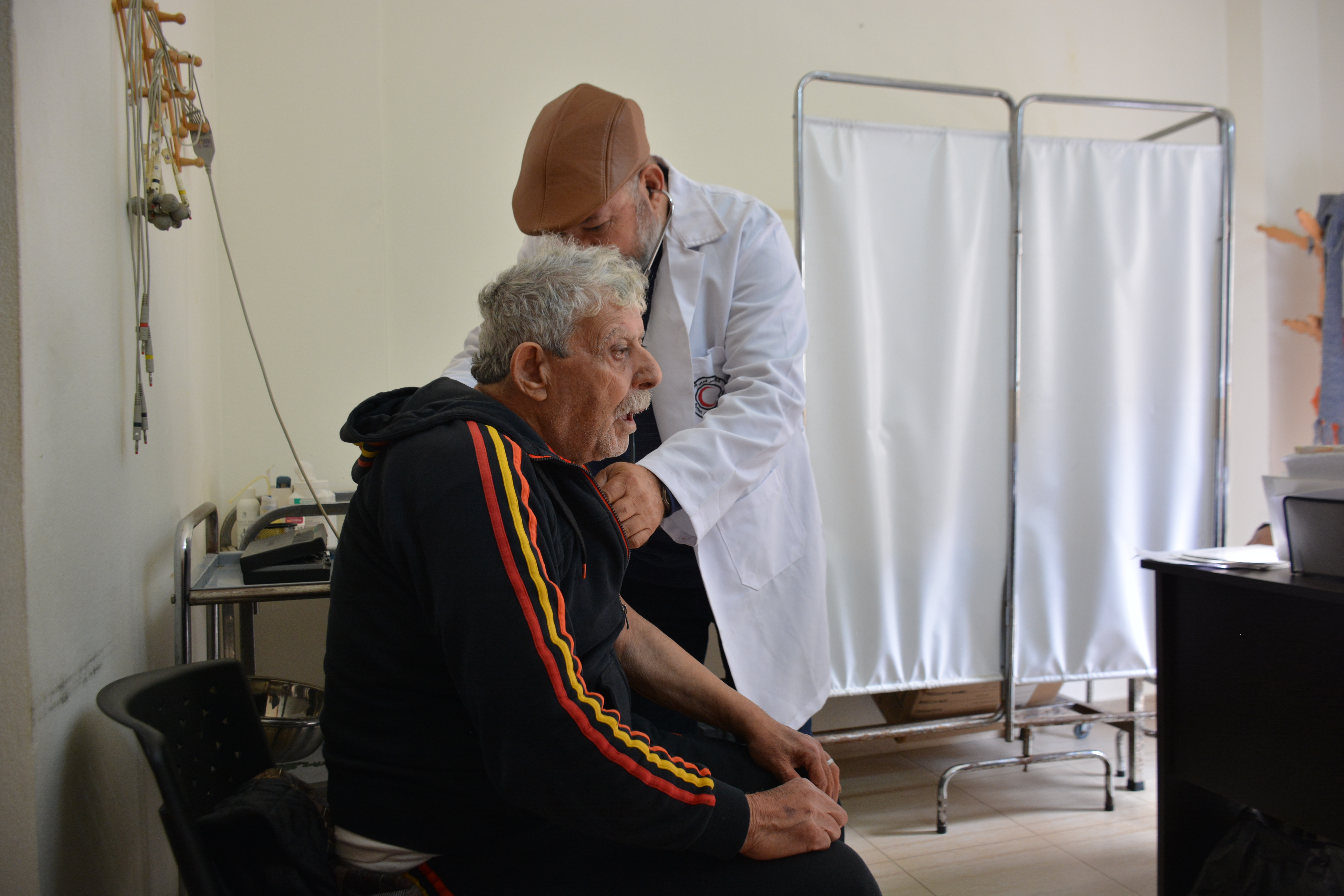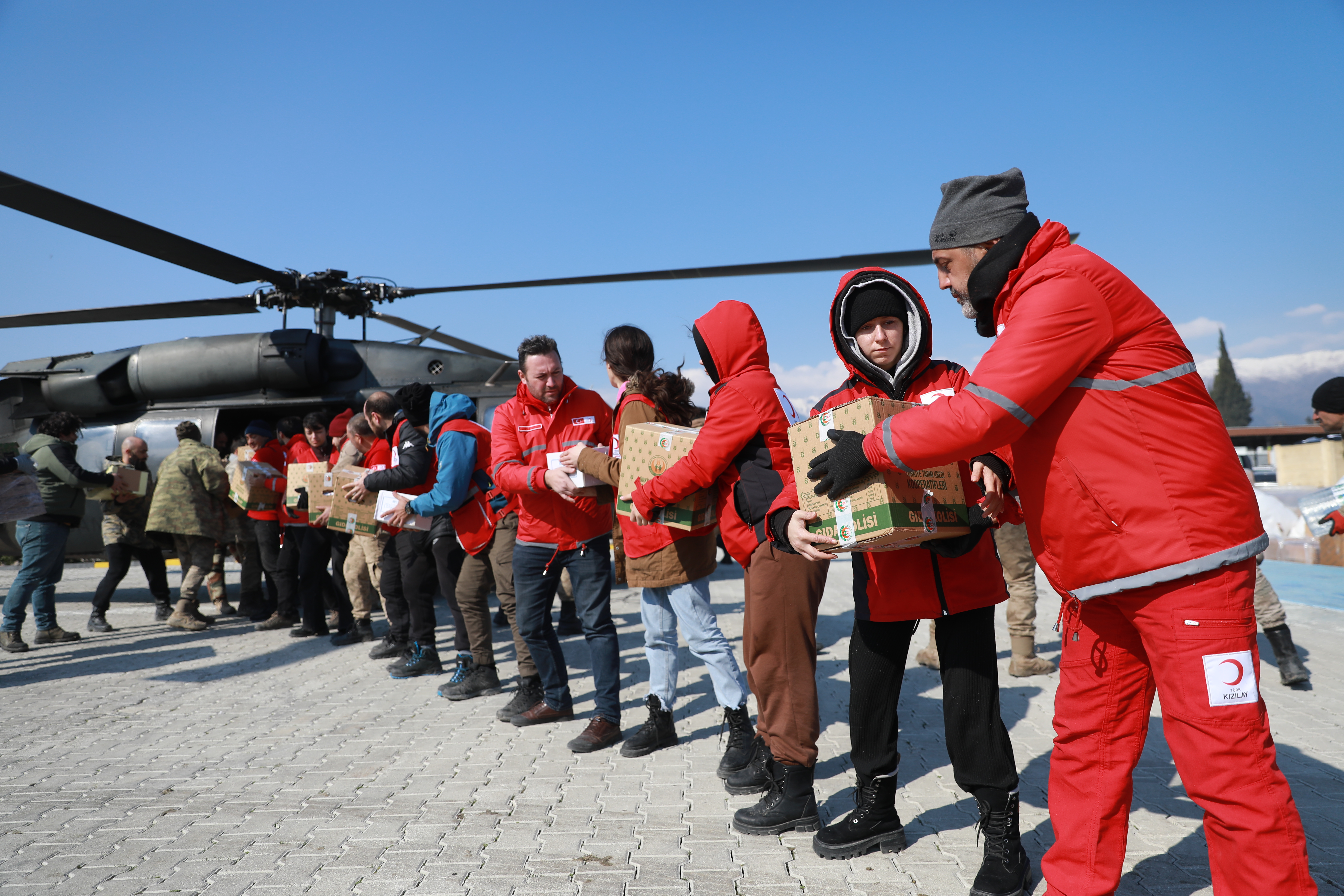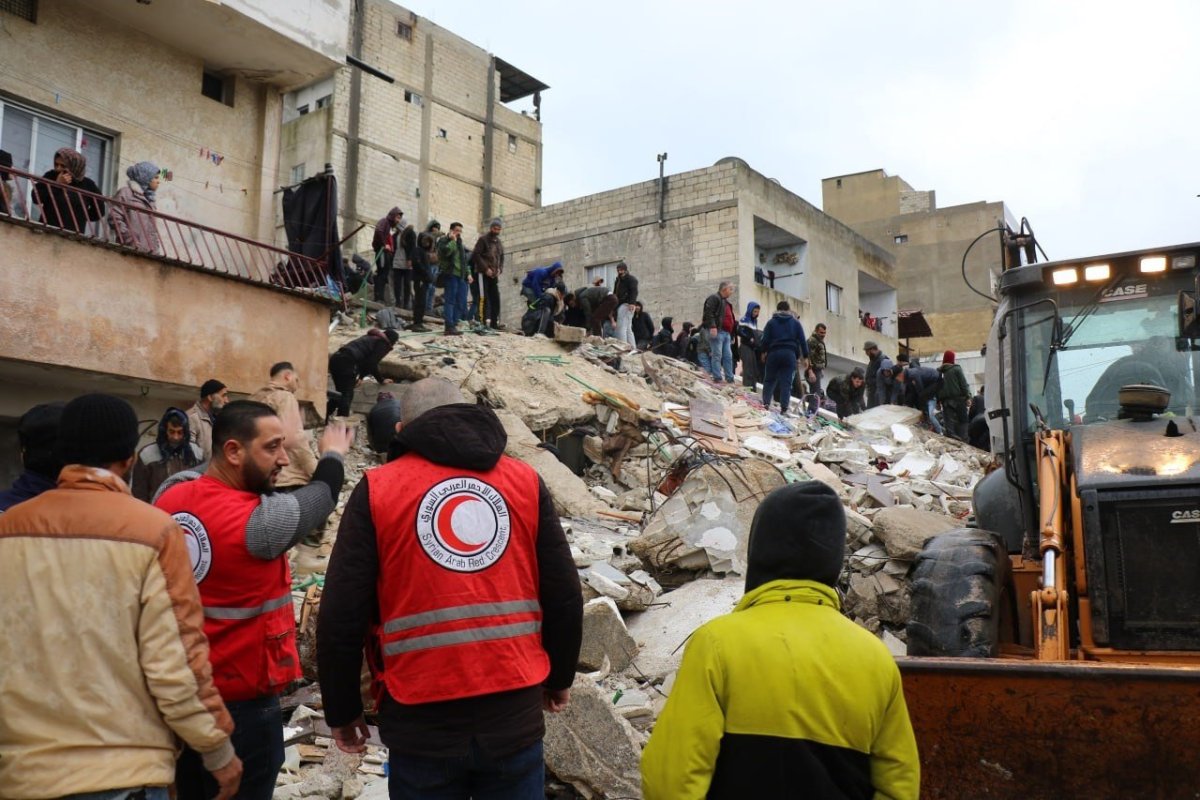Earthquakes in Turkey and Syria
Heavy earthquakes hit parts of Turkey and Syria on Monday, Feb. 6. The material damage is enormous and the human toll is also high.
The Turkish Red Crescent and the Syrian Red Crescent have been on the ground since the start of the disaster, providing the most acute assistance, ranging from rescue operations in the affected areas, to providing medical aid, to providing housing for the victims who no longer have shelter.
Follow updates
February 6
Update: 1 year later
This week marks 1 year since severe earthquakes hit Turkey and Syria. Despite the aid already provided, the needs in the affected areas remain significant and there is still a long way to go to normalize the situation on the ground.
Current situation
More than 400,000 people in Turkey currently continue to live in temporary shelters, such as tents and residential containers, with limited access to clean water. There remains an urgent need for support to restore the local economy and rebuild infrastructure.
In Syria, needs for basic services and medical care remain high, especially in remote areas where malnutrition, especially among children, is a serious problem. Both countries also have an urgent need for psychosocial assistance to cope with the traumas of the earthquakes.

Deployment of funds Belgian Red Cross-Flanders
The money raised by Belgian Red Cross-Flanders, €7,362,955 to date, was used to support the Turkish Red Crescent and the Syrian Red Crescent.
This support, along with that of many other Red Cross Societies, has helped a total of 14 million people in both Syria and Turkey. There are currently 80,000 volunteers and staff working in both countries to provide health care, food, water, financial resources and other basic services.
Needs remain high
In Turkey, relief efforts have gradually shifted from emergency relief to financial support, allowing individuals to determine their own needs and support local economies. Nearly 800,000 people have received shelter in Turkey, more than 250,000 have received mental and psychosocial support, and mobile child-friendly spaces and psychosocial teams continue to treat traumatized survivors. In Syria, the focus remains primarily on basic health care, distribution of food parcels and emergency relief items. Services and materials are provided to 2 primary care facilities and 2 nutrition clinics.

Warm call
Want to support Belgian Red Cross-Flanders ? Then make your contribution using the button below. Your gift to the Emergency Relief Fund allows us to provide disaster relief where it is needed most, free from outside influence and seeking out the most vulnerable.
August 7
Update: 6 months later
It has now been six months since exceptionally severe earthquakes hit Turkey and Syria, resulting in more than 55,000 deaths and enormous damage. The situation on the ground is still precarious, it goes without saying. Picking up "normal life" again is therefore far from being an option for all survivors. For millions of people have lost not only their shelter, but all their possessions. Humanitarian needs remain very high - and unfortunately this will continue to be the case for some time to come.
Much of the victims in Turkey and Syria still live in tents or container villages. They thus continue to need essentials such as food, clean water and medical assistance. Indeed, many of these people have also immediately lost their source of income. Because in addition to houses and apartments, many stores, offices and agricultural infrastructure have also been destroyed. It will be years before they can rebuild their lives and become self-sufficient again. Finally, the psychological impact cannot be underestimated. So there is also a great need for psychosocial support.
In total, the Turkish Red Crescent and Syrian Red Crescent have already deployed more than 200,000 volunteers and staff to provide humanitarian aid. Together, they have already been able to provide temporary shelter to about 850,000 victims and to provide life-saving aid to more than 6 million people. This includes food, clean water, medical aid, clothing, and so on. More than 700,000 victims have already received psychosocial assistance.
Help from Belgian Red Cross-Flanders
Belgian Red Cross-Flanders collected about 7 million euros to date. This includes its own fundraising, the support of the Flemish government and also part of the proceeds of Consortium 12-12. Some 3 million euros have already been used in Turkey and almost 2 million in Syria. Belgian Red Cross-Flanders still has 2 million euros of aid to offer in the coming months and years. Aid that will unfortunately remain desperately needed for a long time to come.
In Turkey, the money from Belgian Red Cross-Flanders has been used for, among other things:
- equipped with more than 200 large family tents
- purchase of two ambulances
- 200,000 euros direct support for Turkish Red Crescent (including food and shelter)
- one million euros support for the International Red Cross, who are also active on the ground (including for potable water and medical aid)
- psychosocial support for victims
In Syria, money from Belgian Red Cross-Flanders has been used for, among other things:
- distribution of food packages
- purchase of medical equipment
- direct financial support for victims
- distribution of hygiene kits
- psychosocial support for victims
Anyone who wants to can still contribute, because the humanitarian needs in the disaster area remain so very high. This can be done via rodekruis.be/earthquake or the Belgian Red Cross-Flanders account number BE53 0000 0000 5353 with the mention "earthquake".
May 9
Update: 3 months after the earthquakes
Introduction
Saturday, May 6, marked three months since one of the largest earthquakes in recent history struck large parts of Turkey and Syria, with devastating consequences. In Turkey, 1.7 million war refugees from Syria were already living in the affected region, while on the Syrian side, a country already suffering the effects of years of war was hit, with an estimated 90% of the population living below the poverty line. To this day, millions of affected people need humanitarian aid in the region, while the capacity to absorb it was already stretched thin.
- In all, more than 55,000 people lost their lives.
- 300,000 people are displaced within Syria.
- 2.7 million people still live in tents or containers in Turkey.
- The earthquake caused damage to structures in a geographical area roughly the size of Germany, and repairing them will cost more than 100 billion euros.
Red Cross and Red Crescent Movement Response
In Turkey
The Turkish Red Crescent quickly mobilized all possible resources to provide earthquake relief, sending both staff and around 150,000 volunteers in rotation to the affected areas. Every day, about 1,000 staff and 1,500 volunteers are on standby to help those in need.
- Food and water: The Turkish Red Crescent distributed 300 million hot meals, at more than 1,000 distribution points, as well as drinking water and ready-to-eat food packages.
- Relief: Nearly 925,000 emergency relief items were distributed, including tents, blankets, stoves and hygiene kits.
- Financial Aid: More than 600,000 vulnerable people were helped with multipurpose cash and another 140,000 with vouchers.
- Psychosocial assistance was provided to more than 113,000 people.
- Health care was offered to more than 26,000 people
- Blood donation campaigns encouraged more than 420,000 people to donate blood.
Belgian Red Cross-Flanders donated more than 160 large, multi-purpose tents to the Turkish Red Crescent in the first weeks after the earthquake. In addition, it, along with many other Red Cross Societies, financially supported the Turkish Red Crescent both directly and indirectly through the International Federation of Red Cross and Red Crescent Societies.
In Syria
The Syrian Arab Red Crescent (SARC) also used all its resources to provide relief after the earthquake, deploying 4,000 staff and volunteers.
- Since the earthquakes, SARC has provided services in more than 200 temporary shelters for people who lost their homes and livelihoods in the earthquake, and continues to provide further support in 54 longer-term collective shelters.
- Health care: More than 1.1 million people were cared for in clinics and through mobile units (basic health care and first aid, maternal and newborn health care, physical rehabilitation and psychosocial support),
- Distribution of emergency relief goods: More than 3.2 million goods were distributed, including food, household items and medical materials.
- More than 185,000 persons were helped with social assistance (psychological first aid, providing information on earthquake coping, anxiety and loss referral to specialized legal, medical and mental health services).
- 217,000 people were provided with clean water, sanitation facilities and goods that help provide basic hygiene.
- In addition, the International Committee of the Red Cross (ICRC) restored water supplies, housing and public infrastructure for millions of people in the affected areas.
Belgian Red Cross-Flanders contributed to this by providing financial support to our partners on the ground, the German and Danish Red Cross, who work closely with the Syrian Arab Red Crescent.
Humanitarian needs
In both Turkey and Syria, large populations will continue to rely on emergency relief in the short and medium term. Millions of people live in temporary housing, such as tents and containers. Critical infrastructure such as water supplies, roads and medical facilities have been damaged, severely limiting access to safe drinking water and health care, especially in Syria. Here, an outbreak of cholera has been recorded across the country, with most cases found in the earthquake-affected areas.
The large numbers of displaced people in Turkey , have very limited access to basic services, especially when they ended up in tent camps. As a result of large migration flows, the population in certain provincial capitals has also increased sharply, putting even more pressure on already limited services there.
Relief funding from both the Red Cross and Red Crescent Movement and the United Nations falls far short of what is needed to meet the basic needs of the affected population. Every donation, regardless of size, helps to alleviate the difficult situation for the millions of people affected.
March 6
Balance sheet 1 month after the earthquakes
Today marks exactly one month since earthquakes hit large parts of Turkey and Syria. The material damage is enormous and the human toll is high:
- More than 50,000 dead and 110,425 injured
- 509,347 people lost their housing
- 12,718 buildings and 248 schools destroyed
This is how the Red Cross helps
Belgian Red Cross-Flanders provides direct financial support to the Turkish Red Crescent and the Danish Red Cross, which helps the Syrian Arab Red Crescent. They help 3.75 million affected residents in Turkey and Syria, day and night.
The Red Cross has already accomplished this in the affected area:
- 85 million food packages distributed
- 107,580 blankets provided
- 54,070 tents for shelter
- 370 mobile kitchens
- 140,000 cash vouchers to affected households for basic services
- 30,000 hygiene products for victims
Feb. 27
Meanwhile, what has already been accomplished with the support raised?
The counter of the money raised in response to the earthquakes in Turkey and Syria now stands at more than 4 million euros.
With the first budgets released, including €200 000 from the Flemish government and €400 000 from the emergency relief fund of Belgian Red Cross-Flanders , the following has already been realized in the meantime:
In Turkey
- Purchase of tents, the first shipment of which left from Belgium last week and a second shipment is also on its way since today.
- Supporting the Turkish Red Crescent Movement. Their main activities at present include:
- Food distributions
- Blood supply
- Providing shelter
- Distributing emergency relief supplies
- Offering psychosocial support
- Providing primary health care
In Syria
- Supporting the Danish Red Cross, which is helping the Syrian Arab Red Crescent in Syria. Their main activities at the moment include:
- Searches under the rubble
- Distribution of life-saving relief supplies, including food parcels, hygiene kits, blankets, mattresses, etc. Meanwhile, the Syrian Arab Red Crescent also managed to reach Idlib with a convoy of emergency relief supplies.
- Support hospitals and ambulance services in the affected regions
- Providing psychosocial support to the affected population
In the coming weeks and months, we will be working hard to also allocate and deploy the remaining budgets where help is needed.
Feb. 17
Already more than 2 million euros raised for humanitarian aid
To date, Belgian Red Cross-Flanders has already raised a total of about 2,150,000 euros for humanitarian aid in Turkey and Syria. That amount goes mainly to financial support, divided between the two countries. In addition, relief supplies are also selectively purchased and sent in our country. But this only involves materials that are still difficult to obtain in large quantities in the region of the disaster. For example, more than 100 large multifunctional tents will leave for Turkey in a few days. These can serve as temporary shelter for large families, but can also be used for logistical or medical purposes if necessary.
In Turkey, the financial aid goes directly to the Turkish Red Crescent - that's the name of the Red Cross Society there - and in Syria, the money is deployed through the Danish Red Cross. Indeed, the latter have historically been active in Syria for some time and, together with the Syrian Red Crescent, are supporting the humanitarian relief efforts there after the earthquakes.
For example, the Turkish Red Crescent has already engaged 352 mobile kitchens, provided more than 81 million small and large food packages, distributed nearly 20 million bottles of water, provided 45,000 tents and distributed 55,000 blankets. And a great deal of humanitarian aid has also been provided in Syria, including 30,000 hygiene products, 25,000 bottles of water, 20,000 medical interventions and the setting up of 175 shelters. Moreover, our colleagues in Syria are also supporting the hospitals with material, medication and personnel.

February 12
Consortium 12-12 joins hands again
Since the massive earthquakes, the death toll has continued to rise to the most recent hallucinatory figure of 35,000 dead. The need for help for the many thousands of survivors also only continues to grow.
Faced with this emergency, the 12-12 Consortium is once again joining forces. The 7 members, Caritas International, Doctors of the World, Handicap International, Oxfam Solidarity, Belgian Red Cross-Flanders/Croix-Rouge de Belgique, Plan International Belgium and UNICEF Belgium are appealing for solidarity in order to collect financial support. This support will be used to finance the emergency relief provided by the 7 organizations in the affected areas. In addition to participating in the Consortium, Belgian Red Cross-Flanders is also continuing its own fundraising campaign.

February 10
Update local relief efforts
In Turkey, during the first phase of the disaster, the Red Cross Red Crescent Movement, in cooperation with local authorities, deployed 763 staff and 3,619 volunteers for rescue and humanitarian relief operations, including the distribution of:
- 2,050 tents
- 137,929 medical tents
- 79 catering vehicles
- 38 communication vehicles
- 2,657 kitchen sets
- 1,507,494 blankets
- 48 beds
- 95 mobile kitchens
- 1 mobile food bank
- 4 mobile oven
- 86 vehicles for basic services
- Field kits for 30,000 people
- 2,489,534 meals
- 523,629 snacks,
- 480,079 servings of soup, 255,265 drinks and 365,467 water bottles
In Syria, the situation is much more complex and obtaining up-to-date information is difficult. So far, we know that the following actions have been taken:
- Distribution of:
- 15 tons of tents and blankets
- 10 tons of medicine and food
- 4900 mattresses
- 9440 blankets
- Transportation of injured to hospitals
- Medical care of injured persons
February 9
Largest telecom operators in Belgium launch text message campaign to benefit earthquake victims
Under the slogan "stronger together," Belgium's largest telecom operators are launching a text message action to benefit the victims of the earthquakes in Turkey and Syria. Anyone sending the message "help" to the number 4330 will donate 1 euro to the Red Cross in the affected countries. The action comes from the operators Mobile Vikings, Orange Belgium, Proximus, Scarlet, Telenet/BASE and VOO, in cooperation with the Ring-Ring platform. There are no additional charges for an SMS. The amount collected will be transferred in full to the Red Cross in the affected countries.








Belgian Red Cross-Flanders Doubles support for humanitarian aid for earthquakes Turkey and Syria to 400,000 euros
Because of the ever-increasing numbers of deaths and casualties, as well as the immense damage to infrastructure, Belgian Red Cross-Flanders is doubling the support from the emergency relief fund to 400,000 euros. "Currently, there remains a great need especially for basic needs," clarifies Sofie De Jaeger, Manager International Cooperation of Belgian Red Cross-Flanders. "That's where we want to make an additional contribution with this increased amount."
The amount will be deployed through the international Red Cross network in the disaster area. And that for the most crucial needs. Right now, those are still the basic needs. On the one hand, that is providing shelter for all victims. That involves, for example, tents, beds, blankets or sleeping bags. And on the other hand, of course, there is also a great demand for food and water. In addition, many small heaters are also needed, because of the freezing weather in the region.
February 6
Belgian Red Cross-Flanders Releases 200,000 euros for humanitarian aid for earthquakes in Turkey and Syria
The effects of the earthquakes in Turkey and Syria are immense: hourly figures of casualties and damage to buildings and infrastructure rise. Especially with the weather conditions in the region - freezing temperatures at night - the situation is all the more precarious.
In addition, thousands of buildings have also been destroyed. "Our colleagues from the Turkish Red Crescent, the Syrian Red Crescent and the International Red Cross can use all the help they can get at the moment," said Sofie De Jaeger, Manager International Cooperation of Belgian Red Cross-Flanders.

